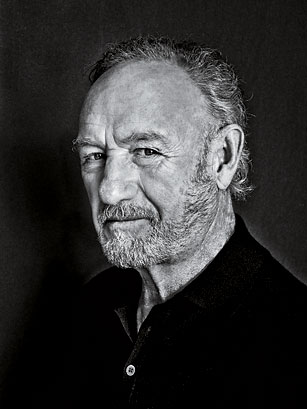
In the first chapter of your new western novel Payback at Morning Peak, your 17-year-old protagonist, Jubal, finds his mother dead, shoots his dad in the head as he burns alive and tries in vain to save the life of his 14-year-old sister, who has just been raped. You wanted it to start slow, huh?Yeah, I wanted to dig myself into a hole so that I would have 300 pages to get myself out. I kind of maybe overdid it a bit, but it was fun trying to solve that dilemma.
The book is violent, and you’ve played characters who are very violent. Is this a theme?
For some strange reason, early in my career — you know, I’m a fairly good-size guy — I was cast as policemen, and you just learn to do that kind of role. Hollywood loves to typecast, and I guess they saw me as a violent guy. I had great difficulty in The French Connection getting into the part of “Popeye” Doyle. Luckily, director Billy Friedkin didn’t fire me. I don’t see myself as a violent guy.
Jubal is roughly the same age that you were when you joined the Marines. Did you draw on some things you learned about yourself during that time?I left home when I was 16 because I was looking for adventure. There was something in the book, certainly, about my young life in China, dealing with being one of the youngest people in my battalion in the Marines. A lot of what I experienced as a young man I kind of exaggerated into what this young Jubal may have found himself doing.
You end the book with a poem. Is poetry another skill we didn’t know you had?No. I struggled with that.
Are you going to write more novels? Perhaps a romantic comedy? [Laughs.] I’m in the process. A police story of some kind.
What was the suckiest job you ever did on your way up?The worst job I ever had was working nights in the Chrysler Building. I was part of a team of about five guys, and we polished the leather furniture. We had to work all night because people needed their chairs during the day. I wasn’t very good at it.
What would it take to entice you to make another movie?I can’t imagine. But I still have a bit of a wanderlust about it. We live in Santa Fe, N.M., and they do a lot of films here, and I will see the wagons on the side of the roads sometimes, and I’d like to go talk to somebody, but I don’t. I did stop once when there was a young assistant director on a backstreet in Santa Fe, directing traffic. I pulled up next to her and asked her if they were hiring any extras. She said, “No, I’m very sorry, sir.”
Is your reluctance because you don’t like the way you look onscreen?There’s a lot of vanity involved. I don’t want to play great-grandfathers. And a lot of it is the stress of moviemaking. You get a little older, and you don’t like to get up at 5:30 in the morning. And night work. I hate night work.
If one of your movies comes on TV, do you watch it?I’ll watch maybe five minutes of it, and I’ll get this icky feeling, and I turn the channel. Rather than being disappointed, I’ve always stayed away from watching my films unless I absolutely had to.
I read that you don’t even know where your two Oscars are. Can this be true?It is true. I have a poster of Errol Flynn, but other than that, around the house we just kind of keep it civilian.
See the top 10 Hollywood remakes
See the 2011 Summer Entertainment Preview